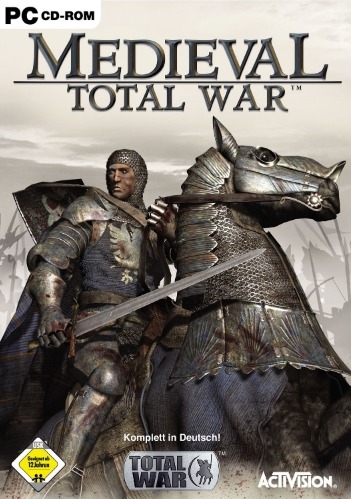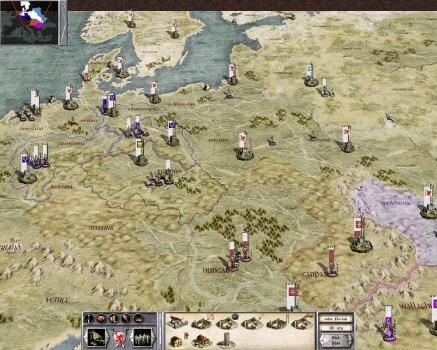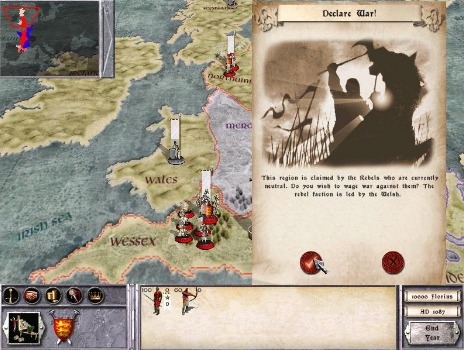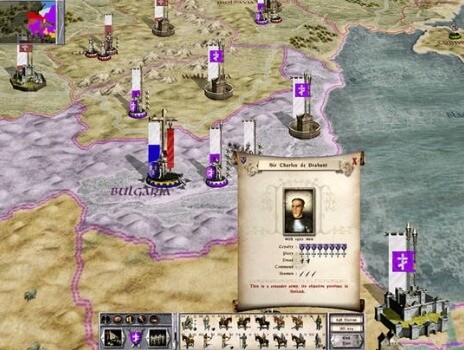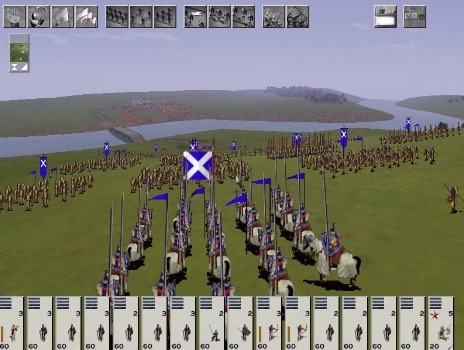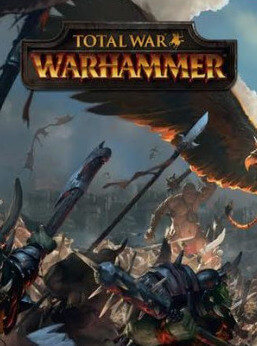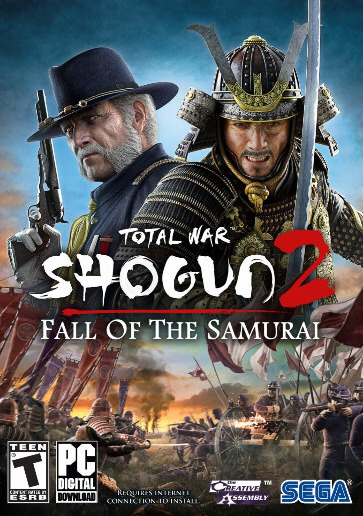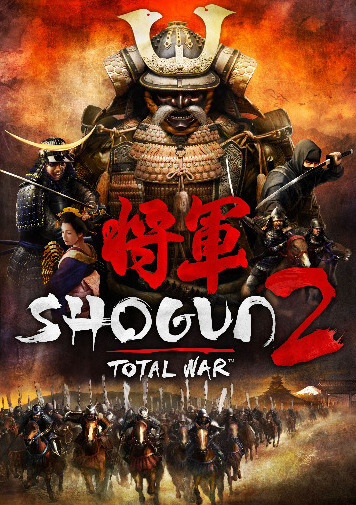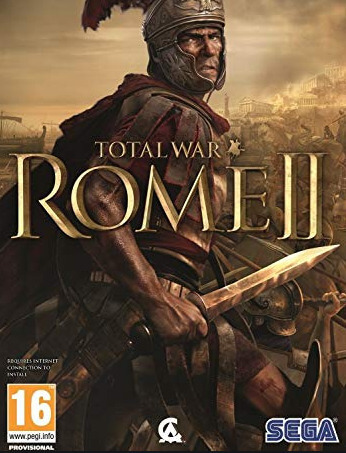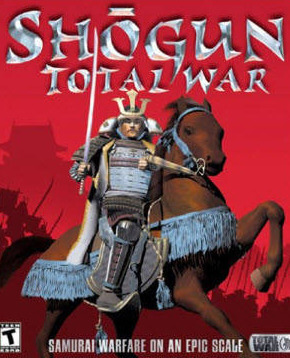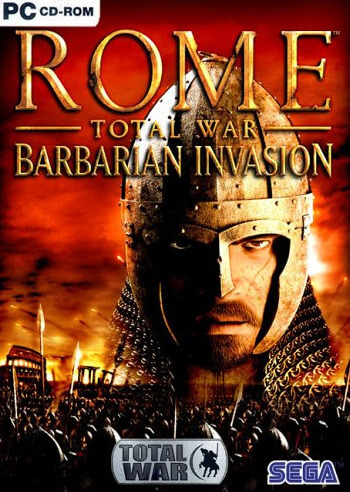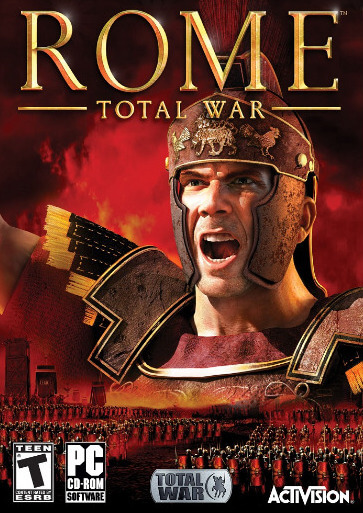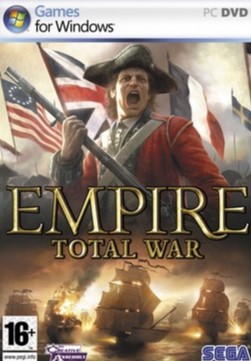The strategic portion of the game divides the campaign map among twenty factions from the period, with a total of twelve being playable. The initial extent of each major faction's territory, and the factions available, depends on the starting period of the game, Early (1087), High (1205) or Late (1321), reflecting the historical state of these factions over time. The factions themselves represent many of the major nations at the time, including the Byzantine Empire, France, England, the Holy Roman Empire and the Turks. Several factions, such as the Golden Horde, emerge during the course of play at their historical time. These factions, together with several other factions appearing at the start of the campaign, are unavailable to the player in the main campaign. Each faction varies in territory, religion and units; however, factions of the same culture share many of their core units.
In addition to the main campaign, Medieval: Total War also features a game mode where the player can undertake various historical campaigns and battles. Historical campaigns allow the player to control a series of famous battles from a war of the medieval period, such as the Hundred Years War and the Crusades, playing as historic commanders like Richard the Lionheart. Individual historic battles have the player controlling a historical figure in an isolated battle that occurred in the era, such as controlling William Wallace through the Battle of Stirling Bridge.
Campaign
The main campaign of Medieval: Total War involves the player choosing one of the fourteen playable factions and eventually leading them in conquest on the strategy map. Each of the factions controls a number of historical provinces, which on the map contain a castle and, if located by the sea, a port as well. In the campaign, the player controls construction, unit recruitment and the movement of armies, fleets and agents in each of these provinces, using these means to acquire and defend the provinces. Diplomacy and economics are two other aspects the player can use to advance their aims, as well as having access to more clandestine means such as espionage and assassination. Religion is very important in the game, with the player able to convert provinces to their own religions to cement the people's loyalty. Another campaign mode is available, called "Glorious Achievements", in which each faction has several historically-based goals to achieve, which score points; the faction with the most achievement points wins the game. The campaign mode is turn-based, with each turn representing one year, allowing the player to attend to all needs of the faction before allowing the artificial intelligence to carry out the other factions' moves and decisions.
The campaign is carried out in a similar fashion to Shogun: Total War, but features many enhancements. The game is set mainly in Europe, but also features the Middle East and North Africa. Production can occur in every province, with the player building from one of the hundreds of connected buildings and units in the game's technology tree. Income to develop provinces and armies comes from taxation of the provinces and trade with neighbouring provinces. There is no specific technology research, but several advances, such as gunpowder, do become available over time. Castles provide the basis for more developed construction in the game, with players having to upgrade to the next castle level to be able to build more advanced buildings; upgrades such as a curtain wall and guard towers can be added to individual castles. Many buildings have economic functions, such as trading posts that generate money, while others are military buildings and allow the training of more advanced unit types. Whilst there are many common unit types, several unique units are available. These units are either restricted to a single faction or are dependent on the control of a particular province. Each unit possesses different strengths and weaknesses.
Each faction has a variety of different generals, some related to the royal family and in line to the throne, and the rest members of the nobility, who command units in the field and can assume offices of the state. Each of these characters has a base ranking for several attributes, such as command ability and piety, which affects how they carry out duties on the battlefield and governing the provinces. These attributes, and other factors such as health, are influenced by “Vices and Virtues”, defining the character's personality and actions. These traits can be acquired seemingly randomly, or may be given to the character through actions in the game. Non-military units, collectively referred to as "agents", may be trained. The types of agent a faction is able to produce depends on its religion, but all factions have emissaries, spies and assassins available to them. Emissaries conduct diplomatic tasks such as start alliances between two factions, or bribe foreign armies; spies allow detailed information to be collected from foreign provinces or characters, while assassins can attempt to kill both foreign and domestic units. Factions also have access to various religious agents to spread their religion, and Christian factions can marry their princesses to domestic generals or other factions for political reasons. Occasionally in the game, a character will be trained bearing the name of a famous historical figure, with better than normal starting abilities. A general such as Richard the Lionheart, El Cid or Saladin will be a capable military commander, while a bishop such as Thomas Becket will have higher piety than normal.
Rebellions can occur if the loyalty of a particular province falls too low, with a rebel army appearing in the province to attempt to assume control from the owners. Civil wars may also take place if several generals commanding large armies have sufficiently low loyalty. In the event of a civil war, the player is given the choice to back either the current rulers or the rebels. It had been planned to allow other factions who had established a prior claim to the throne by marriage to princesses to join in a civil war to claim the throne for themselves; however, this was never implemented. Naval warfare is carried out upon the campaign map, where ships can be built and organised into fleets. These fleets can be used to control the game's sea regions and form sea lanes, allowing trade and troop movement between provinces that have constructed a port. Fleets can engage in sea battles with foreign fleets, although unlike land battles these are resolved by the computer. Religion plays an important aspect in Medieval: Total War, with religious differences between the Catholic, Orthodox and Muslim factions affecting diplomacy and population loyalty. Catholic factions must also respond to the wishes of the Papal States; factions gain favour by refraining from hostilities with other Catholic nations and responding to Crusades, else they run the risk of excommunication. The option to launch a holy war in the form of a Crusade or Jihad is open to both Catholic and Muslim factions.
